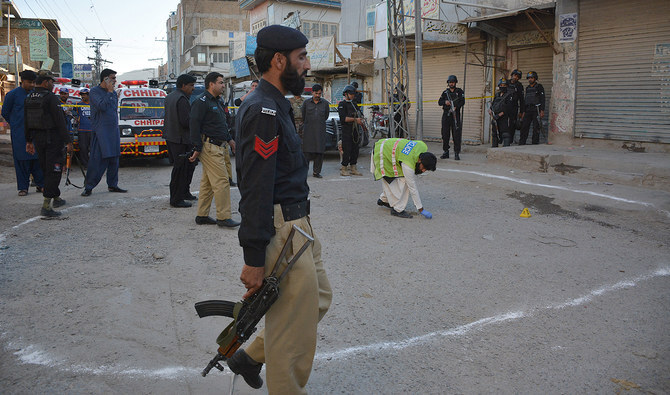QUETTA: A policeman opened fire inside a police station in the southwestern Pakistani city of Quetta on Thursday, killing a suspect held on accusations of blasphemy, a local official said.
The slain man was identified as Syed Khan. Police said he had been arrested the day before, after officers snatched him from an enraged mob that claimed he had insulted Islam’s Prophet Muhammad (pbuh).
According to police official Mohammad Khurram, the officer involved in the fatal shooting has been arrested. Khurram did not provide further details.
Killings of suspects while in police custody are rare in Pakistan, where accusations of blasphemy — sometimes even just rumors — are common and often spark rioting and rampage by mobs that can escalate into lynching and killings.
Under Pakistan’s controversial blasphemy laws, anyone found guilty of insulting Islam or Islamic religious figures can be sentenced to death, though authorities have yet to carry out a death sentences for blasphemy.
In the case of Khan, the man killed on Thursday, local residents claimed he had used derogatory remarks against the prophet and went after him. After he was arrested, the mob surrounded the station, demanding police hand Khan back to them so they could kill him.
At one point, a man hurled a grenade at the station on Wednesday while a group of religious hard-liners briefly blocked a key road in the city, demanding punishment for Khan. The crowd dispersed later in the day after officials managed to calm them down.
Pakistan has witnessed a surge in attacks on blasphemy suspects in recent years.
In June, a mob broke into a police station in the northwestern town of Madyan, snatched a man who was held there and then lynched him over allegations that he had desecrated Islam’s holy book, the Qur’an. The attackers also torched the station and burned police vehicles parked there. The slain man was a tourist staying at a hotel in town when the locals turned on him and accused him of blasphemy.
Last year, a mob in the eastern Punjab province attacked churches and homes of Christians after claiming they saw a local Christian and his friend desecrating pages from a Qur’an. The attack in the district of Jaranwala drew nationwide condemnation, but Christians say the men linked to the violence are yet to be put on trial.
In 2021, a mob of factory employees in eastern Pakistan tortured and burned a Sri Lankan manager over apparent blasphemy.
A policeman in 2011 killed a former governor of Punjab province after accusing him of blasphemy. That officer, Mumtaz Qadri, was later sentenced to death and hanged. However, support for him grew after his hanging, with tens of thousands attending his funeral in the garrison city of Rawalpindi. Many in Punjab still today considered him a martyr.
Quetta, a conservative city in southwestern Pakistan, is also the capital of the restive Balochistan province, where militant groups stage near daily attacks and where separatists have waged a decades-long insurgency against the government in Islamabad.
Policeman shoots and kills blasphemy suspect held at Pakistan police station
https://arab.news/nknwe
Policeman shoots and kills blasphemy suspect held at Pakistan police station

- Syed Khan was arrested on Wednesday after officers snatched him from an enraged mob that claimed he had committed blasphemy
- Accusations of blasphemy are common in Pakistan, often spark rioting and rampage by mobs that escalate into lynching and killings
Pakistan to promote mineral sector at Saudi forum this month with 13 companies

- Delegation will take part in the Future Minerals Forum in Riyadh from Jan. 13-15
- Petroleum minister will lead Pakistan, participate in a 90-minute country session
ISLAMABAD: Around 13 Pakistani state-owned and private companies will attend the Future Minerals Forum (FMF) in Saudi Arabia from Jan. 13 to 15, an official statement said on Friday, as the country seeks to ramp up global engagement to develop its mineral resources.
The FMF is an international conference and investment platform for the mining sector, hosted by mineral-rich countries to attract global investors, companies and governments.
Petroleum Minister Ali Pervaiz Malik confirmed Pakistan’s participation in a meeting with the Saudi envoy, Nawaf bin Said Al-Malki.
Pakistan hosts one of the world’s largest copper-gold zones. The Reko Diq mine in southwestern Balochistan, with an estimated 5.9 billion tons of ore, is partly owned by Barrick Gold, which calls it one of the world’s largest underdeveloped copper-gold deposits. Its development is expected to boost Pakistan’s struggling economy.
“Upon an invitation of the Government of the Kingdom of Saudi Arabia, the Federal Minister informed the Ambassador that Pakistan will fully participate in the upcoming Future Minerals Forum (FMF), scheduled to be held in Riyadh later this month,” Pakistan’s Press Information Department (PID) said in an official statement.
The Pakistani minister will lead his country’s delegation at the FMF and take part in a 90-minute country showcase session titled “Unleashing Potential: Accelerating Pakistan’s Mineral Revolution” along with local and foreign investors.
Pakistan will also establish a dedicated pavilion to highlight the vast potential of its rich geological landscape to the global mineral community.
The Saudi envoy welcomed Pakistan’s decision to participate in the forum and discussed enhancing bilateral cooperation in the minerals and energy sectors during the meeting.
According to the statement, he highlighted the potential for cooperation between Saudi Arabia and Pakistan in the minerals and energy sectors, expressing confidence that the FMF would provide a platform to expand collaboration.
Pakistan’s mineral sector, despite its rich reserves of salt, copper, gold and coal, contributes only 3.2 percent to the country’s GDP and just 0.1 percent to global mineral exports.
However, many countries, including the United States, have shown interest in Pakistan’s underdeveloped mineral sector, particularly in copper, gold and other critical resources.
In October, Pakistan dispatched its first-ever shipment of rare earth and critical minerals to the United States, according to a Chicago-based US public relations firm’s report.










